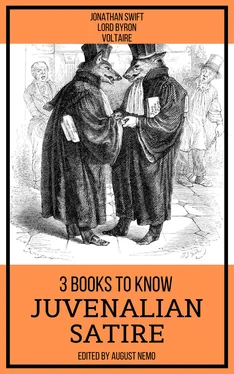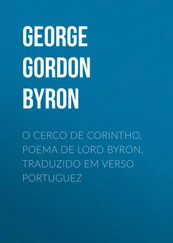1 ...6 7 8 10 11 12 ...32 What opposite discoveries we have seen!
(Signs of true genius, and of empty pockets.)
One makes new noses, one a guillotine,
One breaks your bones, one sets them in their sockets;
But vaccination certainly has been
A kind antithesis to Congreve's rockets,
With which the Doctor paid off an old pox,
By borrowing a new one from an ox.
Bread has been made (indifferent) from potatoes;
And galvanism has set some corpses grinning,
But has not answer'd like the apparatus
Of the Humane Society's beginning
By which men are unsuffocated gratis:
What wondrous new machines have late been spinning!
I said the small-pox has gone out of late;
Perhaps it may be follow'd by the great.
'T is said the great came from America;
Perhaps it may set out on its return,—
The population there so spreads, they say
'T is grown high time to thin it in its turn,
With war, or plague, or famine, any way,
So that civilisation they may learn;
And which in ravage the more loathsome evil is—
Their real lues, or our pseudo-syphilis?
This is the patent-age of new inventions
For killing bodies, and for saving souls,
All propagated with the best intentions;
Sir Humphry Davy's lantern, by which coals
Are safely mined for in the mode he mentions,
Tombuctoo travels, voyages to the Poles,
Are ways to benefit mankind, as true,
Perhaps, as shooting them at Waterloo.
Man 's a phenomenon, one knows not what,
And wonderful beyond all wondrous measure;
'T is pity though, in this sublime world, that
Pleasure 's a sin, and sometimes sin 's a pleasure;
Few mortals know what end they would be at,
But whether glory, power, or love, or treasure,
The path is through perplexing ways, and when
The goal is gain'd, we die, you know—and then—
What then?—I do not know, no more do you—
And so good night.—Return we to our story:
'T was in November, when fine days are few,
And the far mountains wax a little hoary,
And clap a white cape on their mantles blue;
And the sea dashes round the promontory,
And the loud breaker boils against the rock,
And sober suns must set at five o'clock.
'T was, as the watchmen say, a cloudy night;
No moon, no stars, the wind was low or loud
By gusts, and many a sparkling hearth was bright
With the piled wood, round which the family crowd;
There 's something cheerful in that sort of light,
Even as a summer sky 's without a cloud:
I 'm fond of fire, and crickets, and all that,
A lobster salad, and champagne, and chat.
'T was midnight—Donna Julia was in bed,
Sleeping, most probably,—when at her door
Arose a clatter might awake the dead,
If they had never been awoke before,
And that they have been so we all have read,
And are to be so, at the least, once more.—
The door was fasten'd, but with voice and fist
First knocks were heard, then 'Madam—Madam—hist!
'For God's sake, Madam—Madam—here 's my master,
With more than half the city at his back—
Was ever heard of such a curst disaster!
'T is not my fault—I kept good watch—Alack!
Do pray undo the bolt a little faster—
They 're on the stair just now, and in a crack
Will all be here; perhaps he yet may fly—
Surely the window 's not so very high!'
By this time Don Alfonso was arrived,
With torches, friends, and servants in great number;
The major part of them had long been wived,
And therefore paused not to disturb the slumber
Of any wicked woman, who contrived
By stealth her husband's temples to encumber:
Examples of this kind are so contagious,
Were one not punish'd, all would be outrageous.
I can't tell how, or why, or what suspicion
Could enter into Don Alfonso's head;
But for a cavalier of his condition
It surely was exceedingly ill-bred,
Without a word of previous admonition,
To hold a levee round his lady's bed,
And summon lackeys, arm'd with fire and sword,
To prove himself the thing he most abhorr'd.
Poor Donna Julia, starting as from sleep
(Mind—that I do not say—she had not slept),
Began at once to scream, and yawn, and weep;
Her maid Antonia, who was an adept,
Contrived to fling the bed-clothes in a heap,
As if she had just now from out them crept:
I can't tell why she should take all this trouble
To prove her mistress had been sleeping double.
But Julia mistress, and Antonia maid,
Appear'd like two poor harmless women, who
Of goblins, but still more of men afraid,
Had thought one man might be deterr'd by two,
And therefore side by side were gently laid,
Until the hours of absence should run through,
And truant husband should return, and say,
'My dear, I was the first who came away.'
Now Julia found at length a voice, and cried,
'In heaven's name, Don Alfonso, what d' ye mean?
Has madness seized you? would that I had died
Ere such a monster's victim I had been!
What may this midnight violence betide,
A sudden fit of drunkenness or spleen?
Dare you suspect me, whom the thought would kill?
Search, then, the room!'—Alfonso said, 'I will.'
He search'd, they search'd, and rummaged everywhere,
Closet and clothes' press, chest and window-seat,
And found much linen, lace, and several pair
Of stockings, slippers, brushes, combs, complete,
With other articles of ladies fair,
To keep them beautiful, or leave them neat:
Arras they prick'd and curtains with their swords,
And wounded several shutters, and some boards.
Under the bed they search'd, and there they found—
No matter what—it was not that they sought;
They open'd windows, gazing if the ground
Had signs or footmarks, but the earth said nought;
And then they stared each other's faces round:
'T is odd, not one of all these seekers thought,
And seems to me almost a sort of blunder,
Of looking in the bed as well as under.
During this inquisition, Julia's tongue
Was not asleep—'Yes, search and search,' she cried,
'Insult on insult heap, and wrong on wrong!
It was for this that I became a bride!
For this in silence I have suffer'd long
A husband like Alfonso at my side;
But now I 'll bear no more, nor here remain,
If there be law or lawyers in all Spain.
'Yes, Don Alfonso! husband now no more,
If ever you indeed deserved the name,
Is 't worthy of your years?—you have threescore—
Fifty, or sixty, it is all the same—
Is 't wise or fitting, causeless to explore
For facts against a virtuous woman's fame?
Ungrateful, perjured, barbarous Don Alfonso,
How dare you think your lady would go on so?
'Is it for this I have disdain'd to hold
The common privileges of my sex?
That I have chosen a confessor so old
And deaf, that any other it would vex,
And never once he has had cause to scold,
But found my very innocence perplex
So much, he always doubted I was married—
How sorry you will be when I 've miscarried!
'Was it for this that no Cortejo e'er
I yet have chosen from out the youth of Seville?
Is it for this I scarce went anywhere,
Except to bull-fights, mass, play, rout, and revel?
Is it for this, whate'er my suitors were,
I favor'd none—nay, was almost uncivil?
Is it for this that General Count O'Reilly,
Who took Algiers, declares I used him vilely?
'Did not the Italian Musico Cazzani
Sing at my heart six months at least in vain?
Читать дальше












